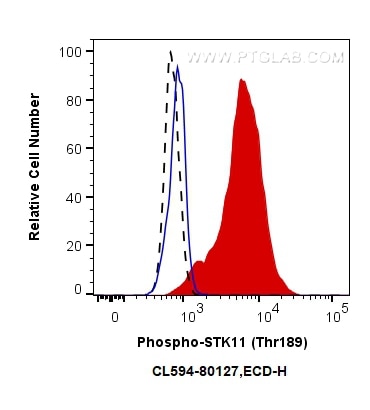Validation Data Gallery
Tested Applications
| Positive FC (Intra) detected in | Calyculin A treated PC-3 cells |
Recommended dilution
| Application | Dilution |
|---|---|
| Flow Cytometry (FC) (INTRA) | FC (INTRA) : 0.13 ug per 10^6 cells in a 100 µl suspension |
| It is recommended that this reagent should be titrated in each testing system to obtain optimal results. | |
| Sample-dependent, Check data in validation data gallery. | |
Product Information
CL594-80127 targets Phospho-STK11/LKB1 (Thr189) in FC (Intra) applications and shows reactivity with human, mouse samples.
| Tested Reactivity | human, mouse |
| Host / Isotype | Rabbit / IgG |
| Class | Recombinant |
| Type | Antibody |
| Immunogen | Peptide 相同性解析による交差性が予測される生物種 |
| Full Name | serine/threonine kinase 11 |
| Calculated molecular weight | 49 kDa |
| Observed molecular weight | 50-55 kDa |
| GenBank accession number | BC007981 |
| Gene Symbol | LKB1 |
| Gene ID (NCBI) | 6794 |
| RRID | AB_2934799 |
| Conjugate | CoraLite®594 Fluorescent Dye |
| Excitation/Emission maxima wavelengths | 588 nm / 604 nm |
| Form | Liquid |
| Purification Method | Protein A purification |
| UNIPROT ID | Q15831 |
| Storage Buffer | PBS with 50% glycerol, 0.05% Proclin300, 0.5% BSA{{ptg:BufferTemp}}7.3 |
| Storage Conditions | Store at -20°C. Avoid exposure to light. Stable for one year after shipment. Aliquoting is unnecessary for -20oC storage. |
Background Information
STK11(serine/threonine-protein kinase 11) is also named as LKB1, PJS, and belongs to the protein kinase superfamily. It controls the activity of AMP-activated protein kinase (AMPK) family members, thereby playing a role in various processes such as cell metabolism, cell polarity, apoptosis and DNA damage response. The tumour suppressor protein LKB1 is a serine/threonine kinase that has been causally linked to Peutz-Jeghers syndrome (PJS). Defects in STK11 are a cause of Peutz-Jeghers syndrome (PJS) and defects in STK11 have been associated with testicular germ cell tumor (TGCT) and some sporadic cancers, especially lung cancers.
